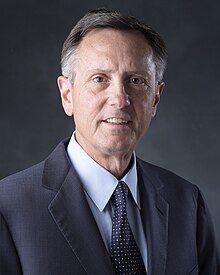Richard Clarida | |
|---|---|
 | |
| 21st Vice Chair of the Federal Reserve | |
| In office September 17, 2018 – January 14, 2022 | |
| Nominated by | Donald Trump |
| Preceded by | Stanley Fischer |
| Succeeded by | Lael Brainard |
| Member of the Federal Reserve Board of Governors | |
| In office September 17, 2018 – January 14, 2022 | |
| Nominated by | Donald Trump |
| Preceded by | Daniel Tarullo |
| Succeeded by | Philip Jefferson |
| Assistant Secretary of the Treasury for Economic Policy | |
| In office February 7, 2002 – May 16, 2003 | |
| President | George W. Bush |
| Preceded by | David Wilcox |
| Succeeded by | Mark Warshawsky |
| Personal details | |
| Born | May 18, 1957 Herrin, Illinois, U.S. |
| Political party | Republican[1] |
| Education | University of Illinois, Urbana-Champaign (BS) Harvard University (MA, PhD) |
Richard Harris Clarida (born May 18, 1957) is an American economist who served as the 21st Vice Chair of the Federal Reserve from 2018 to 2022. Clarida resigned his post on January 14, 2022, to return from public service leave to teach at Columbia University for the spring term of 2022. He is the C. Lowell Harriss Professor of Economics and International Affairs at Columbia University and, from 2006 until September 2018 and from October 2022 to the present, a Global Strategic Advisor for PIMCO. He is notable for his contributions to dynamic stochastic general equilibrium theory and international monetary economics. He is a former Assistant Secretary of the Treasury for Economic Policy and is a recipient of the Treasury Medal. He also was a proponent of the theory that inflation was transitory during the COVID-19 pandemic.[2]
- ^ Timiraos, Nick (April 16, 2018). "Trump to Nominate Richard Clarida, Michelle Bowman to Fed Board". Wall Street Journal.
- ^ [needs cite]